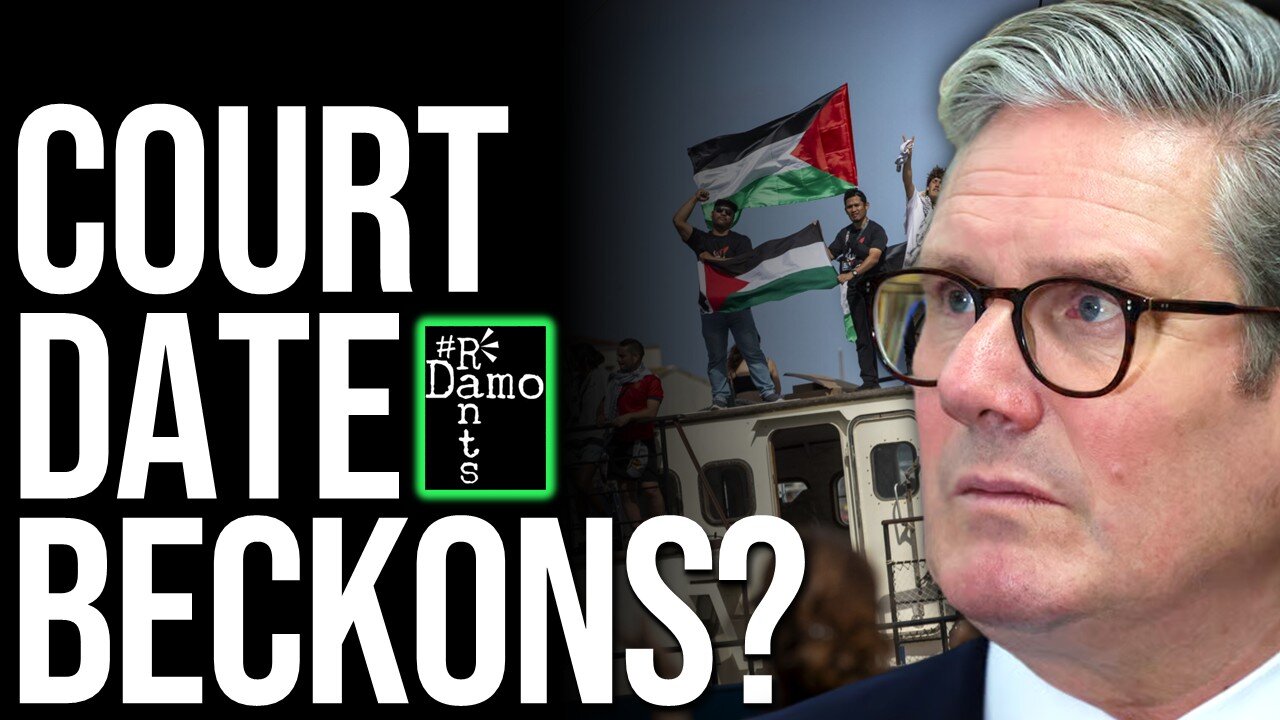Premium Only Content

Starmer Abandoned His Own Citizens for Israel — And Now It’s Exploding
Right, so it takes a special kind of government to boast of being all about “law and order” whilst abandoning its own citizens to a foreign military — and then prosecuting them when they come home. But that’s precisely what Keir Starmer’s rancid Labour administration has managed. When Israeli forces seized the Global Sumud Flotilla, including several British participants in international waters, ministers fell mysteriously silent, as if the Vienna Convention were a quaint suggestion rather than a binding treaty they were signed up to. No protests, no statements, no fuss. Days later, one of those same campaigners, Sarah Wilkinson, was back on British soil — only to find herself arrested at Heathrow and now facing terror charges. In the Starmer era, apparently, defending British citizens is optional; defending Israel from embarrassment is policy. It’s law and order for the cameras — and lawlessness wherever it might cause diplomatic inconvenience. Well, he might not get away with it for much longer, as the law might be reaching out for him.
Right, so last month of course the Global Sumud Flotilla set sail for Gaza. 40-odd small civilian vessels—each carrying doctors, teachers, journalists, and activists—had left Mediterranean ports to deliver food and medicine to the besieged strip and to challenge Israel’s naval blockade, illegal as it is, enforcing starvation as it very much has been doing. Among the passengers were numerous British citizens.
As we know, Israeli naval forces intercepted them in international waters of the eastern Mediterranean. The ships were seized, towed to the Israeli port of Ashdod, and their passengers detained. The volunteers had not entered Israeli territory; they were not destined for Israel, but Palestine, which the UK by that point had formally recognised the statehood of, they were operating on the high seas where the law of the flag state applies. Still, they were treated as security threats to Israel and were kidnapped.
Within days they were all deported, having experienced much abuse in detention.
That is the verified sequence. What happened next—what did not happen—is the heart of this story. The UK Foreign Office acknowledged awareness of the detentions. It apparently offered “consular assistance.” It did not demand release, issue a formal protest, or raise the matter in Parliament though. No press conference. No ministerial statement.
This silence was not an oversight. It was a decision. And we know this because a spokesperson acting on behalf of the government said the detention of British citizens from the flotilla was a matter for Israel.
The Vienna Convention on Consular Relations, ratified by Britain in 1963, defines a clear duty in such circumstances. Article 5(b) states that consular officers must “protect in the receiving State the interests of the sending State and of its nationals.” Article 36 requires prompt communication with detained citizens. A Commons Library Briefing, issued last year, explains how these duties are interpreted: the UK “may” make representations but “cannot compel another State.” In practice, that discretion allows ministers to remain silent whenever the detaining power is an ally.
Human-rights lawyers have long argued that this discretion should be replaced by obligation. In 2024 the charity REDRESS published Protecting British Nationals Abroad, setting out fifteen principles for a statutory right to protection. One of those principles reads: “Where there is credible evidence of serious human-rights violations, the State must act.” The detention of British civilians by a foreign military in international waters meets that test precisely.
International maritime law reinforces it. Articles 87 and 90 of the United Nations Convention on the Law of the Sea guarantee freedom of navigation on the high seas. Boarding and seizing a foreign vessel without consent violates that freedom. When such an act targets British citizens, the UK Government is entitled—and arguably obliged—to protest.
By doing nothing, Britain effectively accepted that Israel could exercise jurisdiction over its nationals beyond its own borders. That is not diplomacy; it is abdication. Sovereignty means the state protects its people from the arbitrary power of others. When that protection depends on who the other is, sovereignty becomes a matter of politics, not law.
The passengers of the Global Sumud Flotilla were civilian volunteers, including British nationals taking part in a humanitarian mission to Gaza. The international coalition behind the voyage has said its crews included medical workers, clergy, and aid volunteers — a pattern consistent with this mission and those that came before it. None carried weapons. All carried the assumption that their government would defend them if detained. It did not.
According to reports, relatives of the detained Britons sought information through the Foreign, Commonwealth and Development Office but received only confirmation that ‘consular assistance’ had been offered. No ministerial statement or detailed account of government contact has been published. The FCDO has not released correspondence or briefings about the detainees, and no public record indicates that it protested the detentions.
The human reality is what gives this case moral weight. These were citizens acting within their rights under international law. Their detention was not an act of war; it was an act of suppression. The silence that followed was a policy choice dressed up as procedure.
In light of all of this therefore, the Public Interest Law Centre (PILC) has issued a pre-action protocol letter to the FCDO and No 10 Downing Street, formally threatening a judicial review. Starmer faces a day in court over this. The letter accused the Government of failing its “duty of diplomatic protection.” It invoked the Vienna Convention and the European Convention on Human Rights—specifically Articles 3 and 5, which protect against inhuman treatment and arbitrary detention of which much testimony from detained flotilla volunteers has been made.
The PILC has given the Government fourteen days to respond. If no satisfactory answer arrives, it will apply to the High Court for permission to proceed. The case, if filed, would mark the first time a British Government has faced judicial review for refusing to defend its own citizens against an allied power. The optics of such a case would be eye-wateringly catastrophic for Starmer’s regime and deservedly so.
That is the line connecting silence to consequence: the government that abandoned its citizens may now have to answer to them in court.
If the High Court agrees with PILC, it could issue a declaration of unlawfulness and order the FCDO to codify a clear, non-discriminatory policy on protecting nationals abroad. The result would be historic. It would turn a moral expectation into a legal duty and frankly it seems bizarre that there is no law compelling the government to protect UK citizens abroad already.
But Starmer has managed to make this dire situation even worse for himself. You see while his Government avoided confronting Israel, it used law aggressively at home against those who are the subject of this PILC challenge.
In August of last year, following the arrest of independent journalist Richard Medhurst, another journalist, Sarah Wilkinson, was raided by anti-terrorism police. She was later released on bail, an act to try and coerce her into silence. Well she’s refused to be silenced and joined this latest flotilla mission as one of the Britons involved. Then, upon her return, she, like Medhurst before her, got arrested upon touching down at Heathrow.
According to West Mercia Police, Wilkinson faces five terrorism-related charges: encouragement, dissemination, two counts of supporting Hamas, and one count of failing to comply with a Section 49 RIPA notice – in other words refusing to give the police a password to access her devices.
Wilkinson is a long-time Palestine-solidarity campaigner. She was detained shortly after returning from the Middle East, where she had taken part in this humanitarian mission. The authorities have not connected her charges to the flotilla itself, but her immediate arrest upon return has raised obvious questions.
The British Government did not object when Israel detained British citizens; it has now charged one of those citizens—or a closely linked activist—with terrorism offences. It is twisted.
A government that failed to protest foreign detention of its own people now prosecutes one of those people for protesting a genocide. As if this government didn’t sicken us all enough before.
Keir Starmer presents himself as the champion of law and order, the former human rights lawyer who has seemingly thrown everything he built his career on, everything he supposedly believed in, out of the window. This pattern of selective enforcement exposes law for the powerless, discretion for the powerful. Under his government, police have used the Public Order Act 2023 to limit marches, arrest pensioners for holding placards, and monitor students for pro-Palestine speech. At the same time, Downing Street refused even to condemn a foreign military’s seizure of British civilians.
The Commons Library briefing warns that consular assistance “should be applied consistently and without discrimination.” REDRESS adds that selective protection “undermines trust in the rule of law.” Those statements are not ideological—they are constitutional. The law that is silent before power ceases to be law; it becomes administration.
This is why the PILC challenge matters so much now. It is not just about flotilla passengers; it is about the meaning of citizenship itself. If the state can pick and choose when to defend you, the bond between citizen and government becomes conditional. Law turns from protection into permission.
This is not Britain’s first moral retreat. In 2002 the Court of Appeal, in Abbasi v Secretary of State, held that the government had a “moral and political” duty to assist a British detainee at Guantánamo Bay but declined to enforce it. The courts recognised the duty’s existence but not its justiciability. Since then, cases such as Belhaj v Straw (2017) have expanded the judiciary’s willingness to review foreign-policy complicity in abuses. The PILC’s threatened action follows that trajectory, asking the courts to convert moral duty into enforceable law.
Historically, the UK intervenes forcefully when its citizens are detained by adversaries but hesitates when the detaining power is an ally. The contrast between the high-profile campaign for Nazanin Zaghari-Ratcliffe and the silence over the Sumud Flotilla is a matter of public record now. Just compare those two situations. The principle appears to be: the friendlier the abuser, the quieter the protest.
That inconsistency erodes credibility abroad and rights at home. It tells the world that British protection is not universal; it is geopolitical.
Mainstream coverage of the flotilla was fleeting. Independent media have picked up the slack as usual. This absence is part of the story. When British citizens are detained by adversaries, the tabloids fill pages; when the detaining power is Israel, the story disappears into the margins. The silence of media mirrors the silence of government, in it together, allowing both to pretend that nothing has happened.
That lack of scrutiny has consequences. It deprives citizens of knowledge, prevents accountability, and normalises a hierarchy of outrage: full sympathy for those detained by enemies, none for those mistreated by allies.
If the PILC proceeds and wins, it will set a constitutional precedent that the duty of protection is legally enforceable. Ministers will no longer be able to hide behind “consular discretion.” The FCDO will have to publish clear criteria for intervention and apply them without political bias.
If the court rules against PILC, the political fallout may still be severe. The case itself exposes the contradiction: that the government had to be threatened with legal action to defend its own citizens. For a Prime Minister who built his career on legality, that is reputational poison, not that he has much reputation left.
Either outcome forces a reckoning. The state must choose between upholding its professed rule-of-law values or admitting that those values stop at Israel’s border – or even international waters miles outside of those borders as the case may be.
The implications extend far beyond one flotilla or one activist. If this silence stands, every British aid worker or journalist operating in conflict zones becomes vulnerable. The passport ceases to be protection; it becomes a political token. Domestically, the broad use of terrorism statutes against solidarity movements narrows the space for civil society. Today the target is Palestine Action; tomorrow it could be climate protesters, other anti-arms campaigners, or journalists exposing war crimes by those same allies the UK government puts before its own citizens.
This is how democratic norms erode—not with a single scandal but through the slow normalisation of selective enforcement. The REDRESS report warns that “failure to protect nationals abroad erodes the integrity of the State.” That erosion is visible now. The Starmer government’s blend of foreign deference and domestic aggression is not an aberration; it is the system functioning as designed.
Sovereignty once meant that Britain would defend its citizens wherever they were. Now it appears to mean the right of ministers to decide when those citizens are politically convenient. Citizenship once implied reciprocal duty; now it guarantees little more than the right to pay taxes and obey laws.
This transformation has moral consequences. A state that abandons its own people cannot credibly lecture others on human rights. It cannot invoke international law to condemn adversaries while ignoring its allies’ violations. It forfeits the moral authority that underpinned British diplomacy for decades.
The PILC case, the flotilla incident, and the prosecution of Sarah Wilkinson are all symptoms of the same condition: the replacement of principle with alignment. The rule of law has been redefined to mean loyalty to power.
For the families of the detained Britons, the legal debates are semantics. What they remember are unanswered calls, nights spent waiting for news, the realisation that their own government would not speak for them.
Sarah Wilkinson faces a different ordeal—months of legal limbo and the prospect of prison. Her supporters call it persecution; the police call it enforcement. Whatever the court decides, the effect is the same: a citizen who tried to expose a humanitarian crisis is treated as a criminal, while those who enabled that crisis are treated as partners.
The remedy is not rhetorical outrage but legal reform. Britain needs a codified duty of diplomatic protection—clear, enforceable, and immune from political discretion. The REDRESS model provides a blueprint. Parliament could adopt it with a simple statute requiring ministers to act when citizens face credible risk of rights violations abroad. Such a law would not weaken diplomacy; it would restore its legitimacy.
Domestically, the government must narrow its definition of terrorism to exclude non-violent political protest, rather than allow the vagaries of the Terrorism Act 2000 to have widened it to include such things. The criminalisation of solidarity is unsustainable in a democracy that claims to value free expression.
All the facts are now on record. British citizens were detained by Israel in international waters. The Starmer government did not object. The Public Interest Law Centre has threatened to take that silence to court. A British activist faces terrorism charges for her Palestine work. The same government that refused to protect her abroad prosecutes her at home.
These events are verified. Together they describe a state that applies law as hierarchy: rigid below, pliant above. It is not simply a foreign-policy failure; it is a constitutional one. A government that enforces law against the weak and waives it for the strong destroys the equality on which law depends.
Whether or not the courts intervene, history will still record that citizens had to threaten their own government with its own statutes to obtain the protection their passports promised. That is the measure of the moment.
The rule of law, once Britain’s proudest principle, now functions as political décor. Until it is restored as an equal standard—binding ministers as well as protesters—the phrase “law and order” will mean nothing more than power deciding who the law is for.
And for as much as Sarah Wilkinson might be facing legal accusations of complicity with a proscribed organisation, complicity in genocide is a far worse accusation and with Italy’s Giorgia Meloni now being the first to face a formal investigation for complicity in Israel’s genocide, a lot of other European leaders, not least our own government here once again, might be right to feel nervous about that. Check out this video recommendation here as your suggested next watch to find out more about that.
Please do also hit like, share and subscribe if you haven’t done so already so as to ensure you don’t miss out on all new daily content as well as spreading the word and helping to support the channel at the same time which is very much appreciated, holding power to account for ordinary working class people and I will hopefully catch you on the next vid. Cheers folks.
-
 1:02:05
1:02:05
DeVory Darkins
3 hours ago $28.61 earnedTrump drops NIGHTMARE News on Democrats as the Violent protestors gear up
94.8K40 -
 1:59:08
1:59:08
The Charlie Kirk Show
3 hours agoCharlie’s 32nd Birthday + Medal of Freedom | Sec. Bessent, Lavorgna, Zeldin, Sen. Lee | 10.14.25
74.6K90 -
 LIVE
LIVE
StoneMountain64
2 hours agoBattlefield 6 Sniping and Unlocking SNIPERS from LONG RANGE
83 watching -
 2:50:25
2:50:25
Side Scrollers Podcast
4 hours agoHasan CAUGHT Red Handed + Hogwarts Legacy 2 “Boycott” + Arbys SUED + More | Side Scrollers
21.6K3 -
 1:08:02
1:08:02
Timcast
3 hours agoTrump DOJ DEFIES THE COURTS, Tear Gasses Anti Ice Rioters, Civil War Fears Escalate
124K146 -
 LIVE
LIVE
Viss
5 hours ago🔴LIVE - Give Us The Battlefield 6 Battle Royale! - BF6 & PUBG
64 watching -
 19:37
19:37
Welker Farms
17 days ago $0.06 earnedTraining Up the NEXT Generation of Farmers - Faith, Family, & Farming!
2.71K2 -
 2:29:00
2:29:00
Steven Crowder
6 hours agoTrump is Winning so Big Even The Left Can't Deny It: Featuring Jason Calacanis of the All In Podcast
351K448 -
 56:22
56:22
TheAlecLaceShow
3 hours agoTrump Signs Historic Peace Deal | Hostages Released | Guests: Matt Schlapp | The Alec Lace Show
14.1K -
 1:03:00
1:03:00
The Rubin Report
4 hours agoObama Can’t Hide His Bitterness at Trump After Middle East Peace Deal
42.6K73